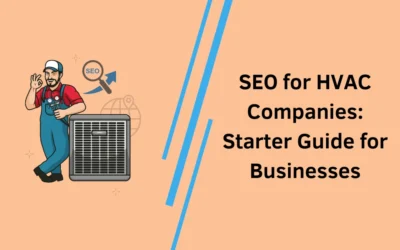How to Grow a Heating And Air Conditioning Business
Running an HVAC business today means navigating fierce competition, shifting demand, and rising operational costs. Many HVAC business owners struggle with seasonal demand, rising costs, and maintaining consistent growth. Whether you manage a small HVAC business or plan to start a business, the right strategy makes all the difference.
In this quick guide, you’ll learn how to grow a heating and air conditioning business with smart, actionable tips for marketing, operations, and customer retention. Perfect for HVAC professionals ready to grow their business and stand out locally.
Key Takeaways
- A clear HVAC business plan helps manage services, pricing, and long-term goals for steady growth.
- In the competitive HVAC industry, consistent marketing keeps your local business visible and attracts a steady stream of leads.
- Skilled, dependable HVAC techs improve service quality, reduce callbacks, and build a strong reputation.
- Smart systems and streamlined processes help small businesses save time, boost profits, and operate more efficiently.
- For every HVAC contractor, providing great customer service and honest communication is essential to turning new customers into loyal clients.
7 Proven Strategies to Grow Your HVAC Business
1. Build a Solid Business Foundation
Every successful HVAC business is built on a solid, reliable foundation. From your business plan to day-to-day operations, getting the basics right makes it much easier to grow and stay organized.
Why it matters: A clear, well-thought-out business plan and smooth business operations save you from financial stress, scheduling issues, and unhappy customers. When your structure is strong, scaling your HVAC business becomes far less complicated.
Here’s what to focus on:
- Make a comprehensive business plan that outlines services, pricing, marketing strategies, and financial estimates.
- Choose the right business structure — whether it’s an LLC, sole proprietorship, or corporation — for tax benefits, liability protection, and growth flexibility.
- Use HVAC business software for scheduling, invoices, and customer record management.
- Set target service goals for offerings like air conditioner installations, emergency repairs, and maintenance contracts.
- Explore commercial coaching or mentorship programs to suit HVAC entrepreneurs.
Pro Tip: Get your HVAC services on Google and popular online directories early. It’s one of the easiest, most effective ways to start building your online presence while you’re setting the rest of your business up.
2. Invest in Effective HVAC Marketing Strategies
No matter how great your service is, customers won’t hire you if they can’t find you. Consistent, strategic marketing keeps your HVAC business visible and ahead of the competition.
Why it matters: A smart mix of online and offline HVAC marketing ideas boosts lead generation, builds brand awareness, and positions your company ahead of local competitors.
Here’s what to focus on:
- Optimize your Google Business Profile for better local map pack rankings.
- Build a conversion-focused website designed for HVAC lead generation.
- Implement local SEO and targeted PPC ads to capture high-intent searchers.
- Actively monitor and respond to online reviews to build a strong, positive reputation.
- Launch email campaigns and Facebook Ads promoting seasonal specials and maintenance packages.
Pro Tip: Use HVAC SEO and hyperlocal PPC—70% of HVAC leads come from online searches, and 78% of contractors invest in digital marketing to capture them.
3. Build a Skilled and Reliable HVAC Team
Behind every successful HVAC company is a dependable, hard-working team you can count on. The better your people, the better your service — and the stronger your reputation in the community.
Why it matters: A dependable, well-trained team reduces callbacks, improves customer satisfaction, and encourages referrals. Additionally, happy employees tend to stay, which reduces the headaches associated with hiring and turnover.
Here’s what to focus on:
- Hire experienced HVAC technicians and invest in ongoing technical training.
- Create clear job descriptions and define responsibilities for every role.
- Offer competitive pay, bonuses, and recognition programs for outstanding work.
- Develop onboarding systems to bring new hires up to speed quickly.
- Build a team culture centered around open communication, safety, and professionalism.
Pro Tip: Companies with well-trained HVAC technicians typically experience significantly fewer service callbacks — in some cases, by as much as 25%.
4. Streamline Your Business Processes and Tools
Outdated systems can slow your HVAC business down and hurt profits. Automating and refining your operations helps you work smarter, not harder.
Why it matters: When you optimize scheduling, dispatching, invoicing, and customer follow-ups, you increase profitability and reduce errors that cost your business time and money.
Here’s what to focus on:
- Upgrade to HVAC business software for scheduling, invoicing, and dispatch management.
- Automate appointment reminders, maintenance follow-ups, and service agreements.
- Track key business metrics like job completion rates, customer satisfaction scores, and profit margins.
- Implement mobile apps for field technicians to access jobs, estimates, and invoices.
- Standardize workflows for installs, repairs, and inspections to improve consistency.
Pro Tip: Audit your current business processes quarterly — small improvements compound over time and can dramatically improve margins.
5. Focus on Customer Experience to Boost Retention
Winning new customers is challenging, but retaining them is where real profit lies. Exceptional customer experiences turn one-time jobs into repeat business and referrals.
Why it matters: Repeat customers drive long-term business health through maintenance contracts, upgrades, and referrals. Prioritizing service quality builds loyalty and reputation.
Here’s what to focus on:
- Offer same-day service or guaranteed response times for emergencies.
- Provide loyalty discounts or membership programs for regular customers.
- Ensure transparent, upfront pricing with no surprise fees.
- Follow up post-service to check satisfaction and request reviews.
- Train staff in conflict resolution and proactive communication.
Pro Tip: Sending a handwritten thank-you card can make a big impression—customers who receive one are 42% more likely to make a repeat purchase, showing real value in that personal touch.
6. Expand Service Offerings and Explore New Business Opportunities
When business growth stalls, diversifying your services can reignite momentum. New offerings attract potential customers and increase your average job value.
Why it matters: Offering complementary services and tapping into untapped markets helps your HVAC business reach new customers and increase average ticket value.
Here’s what to focus on:
- Add services like indoor air quality testing, duct cleaning, and smart thermostat installations.
- Explore commercial HVAC services for office buildings, retail, and warehouses.
- Partner with home service businesses, such as plumbers, electricians, or general contractors, to receive referrals.
- Offer energy audits or HVAC performance assessments for eco-conscious homeowners.
- Invest in seasonal promotions — e.g., pre-summer AC tune-ups or fall furnace inspections.
Pro Tip: Survey your existing HVAC customers about services they wish you offered — it’s the easiest way to spot low-risk new business opportunities.
7. Track, Analyze, and Optimize Business Performance
If you’re not measuring your business, you’re guessing. Tracking your numbers reveals what’s working, what’s wasting money, and where you should focus next.
Why it matters: Data-driven decisions help optimize marketing spend, technician performance, customer service, and profitability. The result? A leaner, stronger, and scalable HVAC business.
Here’s what to focus on:
- Utilize software dashboards to track key metrics, including leads, close rates, and profit per job.
- Regularly review marketing campaign ROI and adjust underperforming channels to optimize results.
- Track technician efficiency, upsell rates, and customer satisfaction scores.
- Identify your most profitable services and focus on promoting them.
- Conduct quarterly business reviews to set new targets and refine your business plan.
Pro Tip: Use dashboards or even spreadsheets to track your metrics — 65% of HVAC companies use cloud-based systems to manage performance, helping refine operations and drive growth.
Conclusion
Your HVAC business won’t grow overnight — it takes consistent effort, smart decisions, and the right support. Whether you are dreaming of starting fresh or you are looking to improve an existing business, these simple, proven thoughts can help you get there. Pay attention to small, meaningful steps. Every improvement you make gives you a step to real business development and helps you create a successful HVAC business that you are proud of.
Ready to grow your HVAC business and stand out in your local market? Reach out to us — let’s build your next chapter together.



